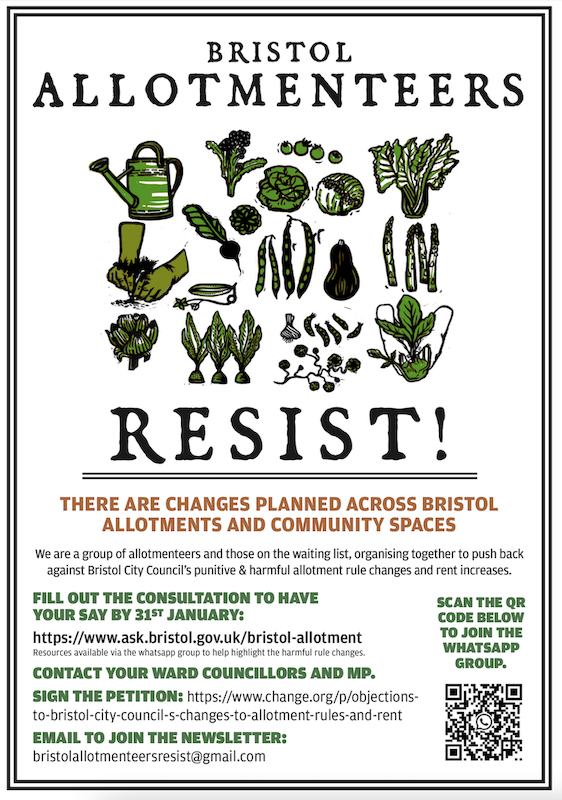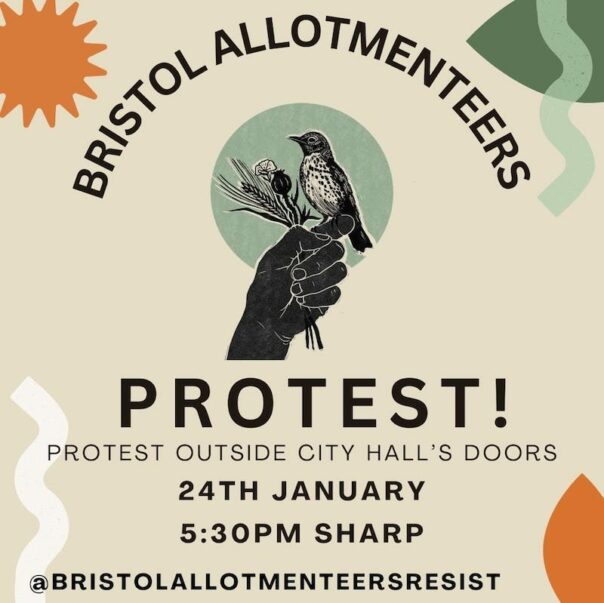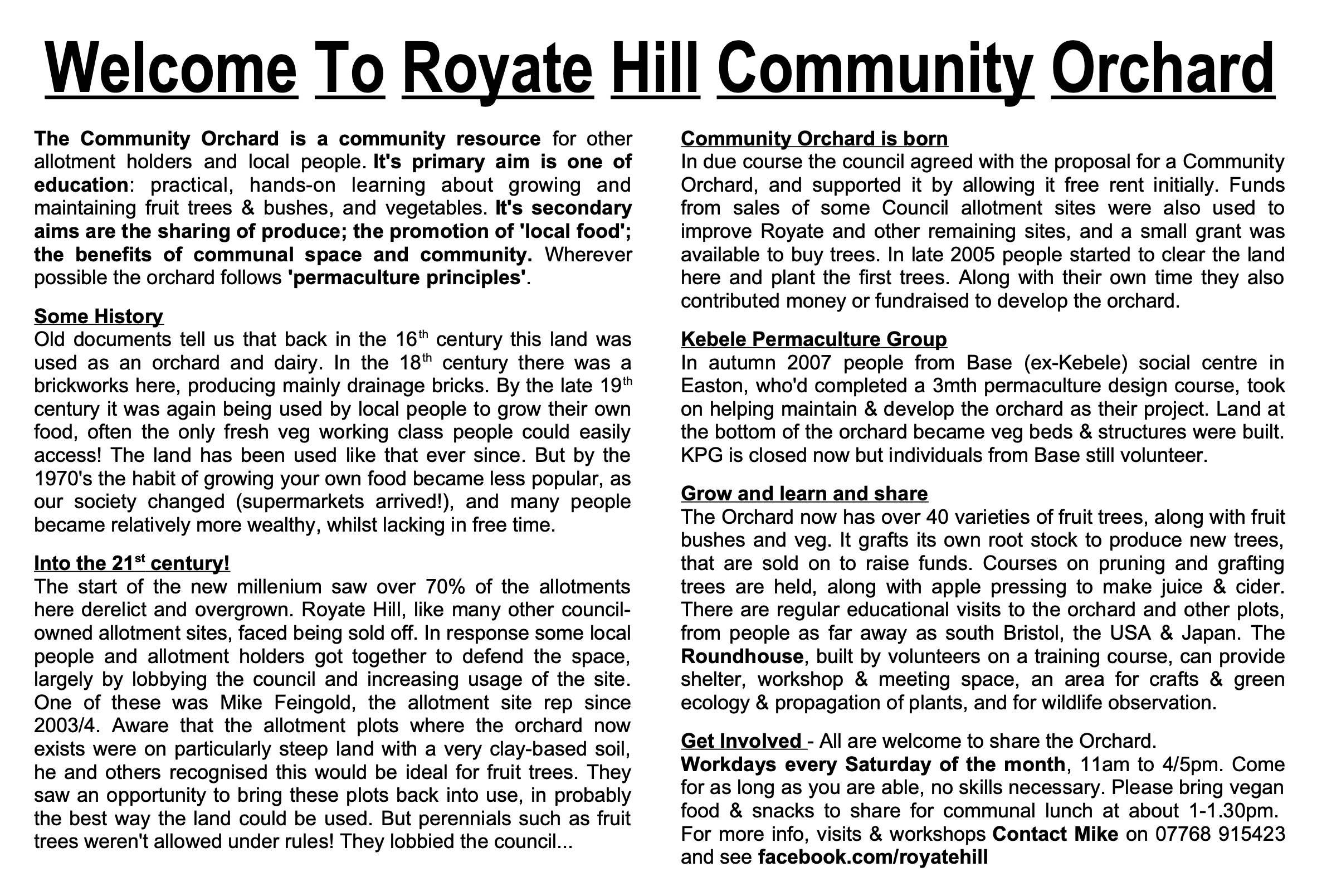
On a wet and windy night on the 4th January 2024, upto 200 people attended the first Bristol Allotmenteers Resist! public campaign meeting, at St Werburgh’s community centre. By 7.05pm it was standing room only. By 7.20pm I was up at the front, with old pal Mike Feingold, the respected local food grower and permaculture teacher. We had 10 minutes max between us, and Mike was going to talk on his 30yrs of allotment experience in Bristol. We’d agreed that I would, quite literally, do ‘1000 years of land and allotment history’ in just 3 minutes (text is below). How did it come to this?
What’s it all about?
On 11th December Bristol Council had launched it’s Allotment Proposals Consultation, that would run longside a Parks and Green Spaces Strategy Consultation, for 6 weeks until 22nd January 2024 (Allotments Proposals consultation, only, now extended to 5pm on 31st January – do respond Bristol!); and we now know that Mayor Rees & his Council Cabinet have the proposals on their Agenda for 5th March to nod through. No meetings were it seems planned with allotmenteers, site reps nor the Council sponsored Allotments Forum (run by volunteer allotmenteers) – although that has been forced to change! A cynic might suggest that this was all a sneaky ploy, given it was almost the start of the winter holidays, with people away or focused on other matters; and plus in winter, when it’s wet and cold, there’s not a lot to do on most allotments, so allotmenteers would not have the chance to meet, chat and organise. When you look at the Proposals, you might well agree with the cynic! They include a roughly average 100% increase for allotment rents (link to pdf); the introduction of a host of new or much increased fees for a range of administrative ‘permissions’ that people would require (can I put a small pond in please sir? Yes you can and that’ll cost you £50 for the permission only!); threatening & punitive ‘charges’ for a range of infringements; a new 35 page Allotment Rule Book (link to pdf) that reads as if written by a stalinist in a darkened room who’d never been on an allotment site; and a range of other documents. Not easy on the eye to read, it takes a good 6 to 8 hours to read everything, and longer to digest it all.
Despite some flowery and apparently well meaning language on the Proposals introduction, a range of assumptions are made and ‘facts’ alluded to, but with nothing to back them up. No statistical comparison with allotment rents in similar sized cities; no recent budgets for the Allotments Office and service, and no projections on future income/expenditure; no justification for an alleged 8000 strong allotments waiting list – when was it last updated?; no short history of the Council’s allotment service, so whilst claiming the rent inrease would fund 1 more staff member, no mention of why the old Allotments Team had been cut from 7 staff over the last dozen years, to just 1 Officer.
There’s no analysis of the current service in terms of response times, speed of relets and so on…just a desire for it to be better, but no admission that presently it’s a failing disaster; and no real admission that for any of this to improve the Council will have to rely on volunteer Allotment Site Representatives to do the relets and police their fellow allotment tenants – classic ‘divide and rule’, but there’s already a decline in site rep numbers as many despair at their attempts to deal with the council, and numerous sites have no reps now. In addition many have noted that a lot of the punitive threats and measures in the new Rule Book appear to totally contradict the Council’s previous statements/policies around bio-diversity, climate change emergency, sustainability and food justice.
Read – these articles give a flavour of just some some of the concerns about the the Proposals: Edible Bristol – Food Justice and Allotments and Allotments are rooted in the struggles of the working classes; Bristol Tree Forum – Response to some proposals; Avon Wildlife Trust – response; Mike Feingold – On Saving the Royate Hill allotment site; Allotmenteers to protest over draconian new rules;
We should remember that the Council effectively holds the allotments land in trust for the people of Bristol, it’s our land and we demand a say in it! But the Council wants to make us pay for their mismanagement, their overspends elsewhere, and their failings generally; once again taxing further those least able to pay.
We write our own stories of resistance
The release of these Proposals just before the winter holidays backfired. Within days enraged allotmenteers had organised. A Petition of Objection to the Proposals was launched aiming for 3500 Bristol signatories to force a full Council debate (do sign it here and add your Bristol post code); a whatsapp chat was launched named Bristol Allotmenteers Resist!, which quickly mutated into a whatsapp community (join here) of circa 500 people, with at least 8 working sub-groups; those sub-groups are now mutating onto a Discord server; there’s an FB Group for those who prefer it old school; now an Instagram account; posters/flyers produced and put up around allotment sites and handed to people; a contact email to get the Public Meeting minutes and the 2 newsletters so far produced – bristolallotmenteersresist[at]gmail.com; plus a wide range of info, stats, articles and info from other allotment campaigns – produced or collected by the campaign to push back with. Alongside all that, local media has picked up on all the noise, with news articles & interviews on BBC Bristol website/radio; Bristol 24/7; Bristol Post; ITN West news, plus of course much agitating on people’s social media.
Meanwhile campaigners have been lobbying their local councillors and MP’s, resulting in Green Councillors stating that if they win the Council Elections on 4th May they’ll rethink and restart the whole process (keep an eye on that one!); firing off emails, questions and complaints to Council officers and bosses and Cabinet members; signing up for the Allotments Forum on the 24th January at City Hall; and much more.
Breaking news – Lobby of Allotments Forum at City Hall called for on Wednesday 24th January, meeting 5.30pm sharp outside the front doors before it starts at 6.15pm. Note that this ‘should’ be attended by the Cabinet lead for Parks, Allotments etc, Cllr Ellie King, and by the Allotments Manager, and by who knows else from the Council – anyone seen Mayor Rees’s diary? With the Cabinet set to decide on the Allotment proposals on 5th March, just weeks before the Council ceases to make new decisions on 28 March before the Council Elections, this Forum is a rare opportunity to get our voices heard! Will the Labour Group rein in their Council Cabinet as they face tough looking local Council Elections?

1000 years of history!
The Bristol Allotmenteers Resist! campaign is already creating it’s own story of struggle, whilst the most recent high profile issue of Bristolians ‘making history‘ that I can think of would be the toppling of the Colston statue, and all that followed. So whilst I’m pretty good on contemporary social struggles, my knowlege of the story of ‘land’ is just average, and my knowledge of allotment history very sparse. I’m no highly educated academic, nor trained researcher, but a very wet winter holiday season, plus a computer, gave me a start. It was time to hit the search engine for ‘Allotment history UK’…and a lot came up. Fortunately there seemed to be a general consensus on the basic origins of allotments, and on the long history of land ownership increasingly being seized by fewer and fewer hands, again and again.
But how to condense all that into just 3 minutes? Broad strokes, sweeping generalisations, write it down and read it out – stick to the text. I almost did!
A thousand years of land and allotment history (in 3 minutes)
Allotment history is intrinsically linked to the history of land, and access to it. Land signifies wealth and power, and over several millennia it has been owned by increasingly fewer numbers of people.
Arguably the beginning of what we know as allotments now began in the 17th century. From 1604 to 1914 more than 5000 Enclosure Acts of Parliament saw upto a further 30% of land in England transferred into a decreasing number of private hands. One statistic suggests that in 1786 there were 250,000 independent landowners, but by 1816 there were only 32,000.
This 300yr period broadly covers the Agricultural Revolution, the Industrial Revolution, and of course the massive shift of the ever growing population into urban centres from rural areas.
At times, so-called philanthropic landowners & industrialists, and their political representatives, made land available for workers to grow food, largely because they thought it was good for the workers, and to help stave off discontent. These were privately owned allotment sites, tenancies were neither permanent nor guaranteed, and could be removed on a whim.
During such crisis as the two World Wars, and also the depression of the 1920’s into 30’s, Governments acted to increase home food production by making land available for allotments/food growing (ie Dig for Victory), but this was generally temporary and ended once the ‘crisis’ was over.
Of course workers both rural and urban always tried to push back to improve their situations. Many will have heard of the 17th century Diggers, and they weren’t the only ones who attempted to reclaim land. From the 1845 General Enclosure Act onwards, various Acts of Parliament began to set the scene for making land publicly available for allotments, but always in a controlled way. The Allotment Acts of 1908, 1922, 1925 & 1950, in theory at least, forced local authorities to make provision for allotments, and to stop them easily selling them off again, for example to developers.
What we now know as the National Allotment Society can be traced back to about 1901 when it started as a members co-operative, and it remains an Industrial & Provident Society to this day. Presently NAS state they represent around 125,000 members.
Allotment plot numbers peaked in 1943 at 1.4 million plots. This declined to around half a million in the early 1970’s, and since the early 1990’s there have been fewer than 300,000 and that remains the situation now with circa 270,000 plots (just over 4000 in Bristol run by the Council, and a further 1500 managed by associations on a council lease).
Further reading – some resources used
Two long reads: Brief history of allotments in England; A brief history of the allotment movement in Britain, based on Growing Space by Lesley Acton (opens as 13 page pdf).
Some short reads: National Allotment Society – brief history of allotments; Allotment history – a brief history of allotments in the UK; Allotment history – the first allotments; Allotment Legislation;
Some books: The Allotment by Colin Ward and David Crouch (1998/2023); Yesterday’s To-morrow – Bristol’s Garden Suburbs by Stephen Hunt (2009/15, BRHG)
